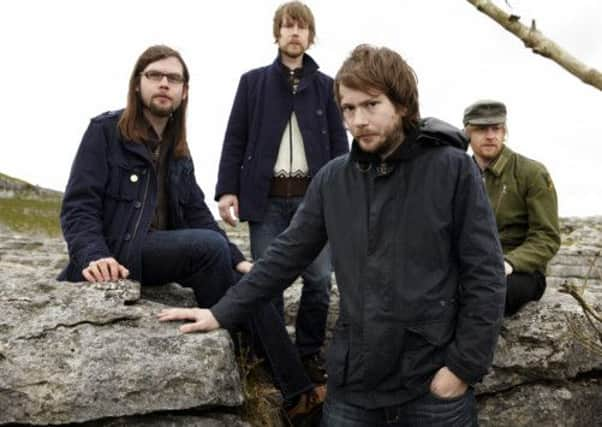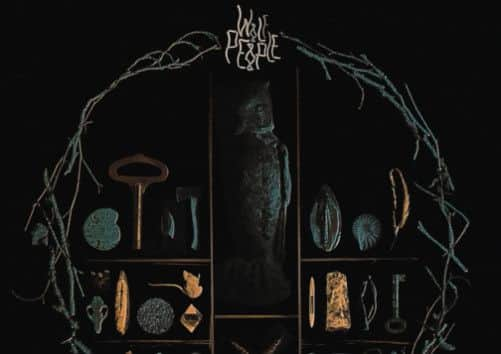Join the pack crying wolf ahead of gig


Formed in 2006, Wolf People are one of the most exciting bands on the British psychedelic rock scene.
Their music harks back to the days when male grooming was an alien concept and rock music rocked.
Advertisement
Hide AdAdvertisement
Hide AdWolf People’s second album Fain was recorded here in Yorkshire, in an isolated house near Skipton.


Released last month, Fain draws influence from a mixture of traditional British folk music, Scandinavian progressive rock, and underground psychedelic rock from the 60s.
Drummer Tom Watts, 33, said: “For this album we took all of our gear up to guitarist Joe’s house in Yorkshire. It’s really nice to conceive of an album in such an inspiring place – we recorded our last album Steeple in a really nice location in Wales. This album was recorded in another beautiful place – location is really important for us.”
Although not from Yorkshire originally, lead guitarist Joe Hollick, 29, is proud of the fact that Fain was recorded in his adopted hometown of Skipton, North Yorkshire.
Advertisement
Hide AdAdvertisement
Hide AdHe said: “I’m a bit of a turncoat because I’m from Lancashire originally and I’ve defected across the Pennines. It meant a lot to record the album in Yorkshire because it’s quite nice to put Skipton on the map.
“I rented the house from the landlord under the proviso that we would be recording a four piece noisy rock band in the front room.
“It’d be good to drive past the house in the future and know that that was where Fain was recorded.”
Wolf People’s sound has its roots in the British folk-rock and biker scenes of the late 60s and early 70s.
Advertisement
Hide AdAdvertisement
Hide AdTheir breakout single, Tiny Circle, with its punchy guitar and infectious flute riff have seen comparisons to British progressive rock band Jethro Tull – a comparison which the band initially resisted.
“I don’t think our sound has ever been a conscious decision like it is with many other bands.
“It’s not like we sat down and said ‘right, we want to make music, what kind of music shall we make?’ – we started making some music and this is what it sounded like,” explained lead vocalist and guitarist Jack Sharp, 31.
“I’ve probably known more about Jethro Tull through people talking about it and making comparisons than I did before Tiny Circle – it’s an accident that we’ve ended up sounding this way.
Advertisement
Hide AdAdvertisement
Hide Ad“I spent ages telling people that we don’t sound like Jethro Tull at all, but then you hear certain songs and you think ‘oh actually, I know what you mean’.”
The band, however, see some of their influences as being a little more modern, with guitarist Joe drawing inspiration from the ’90s indie scene.
He said: “John Squire from The Stone Roses and Nick McCabe from The Verve were massive influences on me. Before them I’d only heard of guitarists like Chuck Berry, Mark Knopfler and Eric Clapton – but Squire and McCabe were the people who guitarists my age looked up to.”
When the band do make a conscious effort to draw influence from other artists, Joe said that it is often a fruitless task: “We listen to this stuff and get really excited by it, but when we all get into a room together we end up just sounding like us.”
Advertisement
Hide AdAdvertisement
Hide AdIt’s a sound which is both intricate and jarring, with urgent drumming and hard riffs making way for gentle vocal melodies. But for the unassuming Jack, Wolf People are a band aware of their limitations: “It’s fair to say that as musicians we are all quite limited.
“We’ve tried to emulate these records by people who are much better than us, so we’ve had to work out ways around it.
“So we’re always striving to reach it and not quite getting there – I think that’s defined our sound.”
With their show about to start at Leeds’s Holy Trinity Church, the band took a moment to take in the atmosphere of the building with the ethereal glow of the large stained-glass window creating a soothing ambience, and the ancient stones of the floors and walls making for an echoing sound that excited drummer Tom.
Advertisement
Hide AdAdvertisement
Hide Ad“It makes my drums sound like Led Zeppelin’s When the Levee Breaks,” he says. “Which in my eyes is a good thing.”
Bassist Daniel Davies, 37, believed that Wolf People’s traditional folk influences made it the perfect location for their vocal sound:
“Some of the melodies are quite plainsong, so they really suit this kind of setting.”
What came across when speaking to the band is just how passionate they are about their music, and how much they care about their songs.
Advertisement
Hide AdAdvertisement
Hide AdFor them being in a band is not merely a means to getting rich, but is a way to communicate something deep, beautiful and lasting. Tom says: “We don’t do things that are going to immediately grab people’s attention and pack gigs out.
“We want to make something that people will remember – something we can leave behind and be proud of.”
It is the legacy and longevity of the music that the band value most.
Jack explained: “We want to leave behind the absolute best records we can –what people say about it now doesn’t matter.
Advertisement
Hide AdAdvertisement
Hide Ad“But if people are still listening in 10, 20 years, then you can feel like you’ve actually achieved something.”
Wolf People – Fain is out now on CD/LP/Download from Jagjaguwar Records (Catalogue number: JAG230). Visit: www.wolfpeople.co.uk
Atmospheric setting for arts
Holy Trinity Church is a Georgian church that sits in the shadow of Leeds Trinity shopping centre.
For the past decade, the church has operated the successful Arts@Trinity which sees community-led cultural projects operating within the building of the still active church.
Advertisement
Hide AdAdvertisement
Hide AdArts@Trinity plays host to a range of arts events from concerts to exhibitions, and was recently one of the key venues in the Live at Leeds music festival.
The interior has not been acoustically treated, so the building offers a unique sound where music reverberates around the building’s structure.